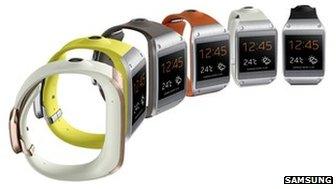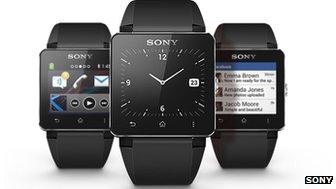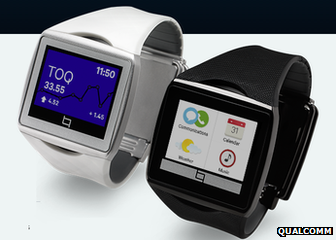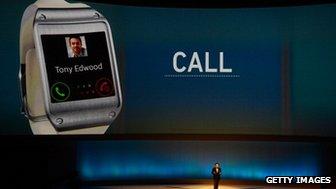Samsung unveils Galaxy Gear smartwatch accessory
- Published
- comments
Rory Cellan-Jones: "Why would anybody want a watch that thought it was a phone?"
Samsung has unveiled a smartwatch with a colour screen that can show alerts, be used for voice calls and run apps.
The Galaxy Gear, external had been highly anticipated since the firm is currently the world's best-selling smartphone maker and has beaten Microsoft, Apple and Google to unveil such a device.
Samsung called it a "fashion icon".
However, analysts warned that a decision to limit the watch to working as an accessory to other Galaxy Android devices might limit its appeal.
Samsung has previously said growth in the sales of its handsets was slowing, so investors are eager to see if it can find another successful product.

The Galaxy Gear is being made available with a range of colourful watch straps
It unveiled the watch - which will go on sale from 25 September - at the Ifa consumer tech show in Berlin.
"The introduction of the Galaxy smartwatch comes as no surprise to the industry, which has been expecting Samsung to beat the likes of Apple - as well as watchmakers and other consumer electronics companies - to market," said Chris Green, principal technology analyst at the consultancy Davies Murphy Group.
"Consumers might be a bit disappointed to find that the smartwatch is a partner device reliant on being paired with a Samsung Android smartphone or tablet, rather than being the completely autonomous media and communications device many consumers were expecting and hoping for."
The South Korean firm's approach contrasts with that of Sony, whose forthcoming Smartwatch 2 can be paired with any device running Android 4.0 or higher.
But one industry watcher said Samsung's decision should not be a surprise.
"Samsung is trying to build its own ecosystem, so why do something that brings value to somebody else?" asked Carolina Milanesi, an analyst at tech advisers Gartner.
"Although the price of the Galaxy watch is high there's not going to be great margins as there's lots of technology going into it."
Samsung says the Galaxy watch will cost about $300. That is the equivalent of £190, although the firm has not announced a UK price yet.
However, it is already clear it will cost more than Sony's £120 device.
Start-up Omate is planning to release a watch in October that matches Samsung's in price, but its device is set to feature a 3G chip, meaning it can make calls and work as a standalone device.
Qualcomm has also unveiled Toq, a watch using the firm's Mirasol colour display technology, which should mean better battery life than its rivals. It also links up to a range of Android smartphones, and will go on sale next month at a suggested retail price of £190.
Unknown demand
The Galaxy Gear features a 1.6in (4cm) LED display, a 1.9 megapixel camera, a speaker and microphone, has four gigabytes of internal storage and a non-removable battery.
Samsung said the watch could be used as a way to make voice calls without having to take the phone it was linked to out of the owner's bag or pocket.
It comes preloaded with 10 different clock options and there will be about 70 apps available at launch including Evernote's note-taking software, auction service eBay, the social network Path and several fitness programs.

Sony's Smartwatch 2 is compatible with more makes of Android phone
Gartner has predicted the global wearable computing market - which includes eyewear such as Google Glass and activity tracker armbands - could be worth as much as £6.5bn ($10bn) by 2016.
Tech consultancy Canalys has forecast as many as five million smartwatches could be sold in 2014.
But in truth no-one is sure how great consumer interest will be.
A new survey of more than 1,500 smartphone owners in the US and UK commissioned by telecoms consultancy CCS Insight might temper expectations.
It found 65% of the respondents had heard of smartwatches and more than 50% knew about wearable fitness trackers.
However, of those who already owned a smartwatch or fitness band, more than 40% had stopped using it because they often forgot to put it on or had become bored with the idea.

Qualcomm's Toq may help promote its Mirasol screen technology
"Samsung has a history of latching on to the latest trends and throwing a product into the market to try and get ahead of potential rivals," said CCS Insight's Ben Wood.
"Galaxy Gear is the first attempt but I expect that there will need to be several more iterations before it is something that will will appeal to anyone other than an affluent geek."
Unappealing 'anachronism'
Ms Milanesi agreed that neither Samsung nor Sony's watches were likely to be the breakthrough product that makes smartwatches a mainstream product.
"Once you get a curved display you'll see more interesting designs, but for the moment you are basically just putting a glass screen on a wrist and I don't think that will appeal to many," she said.
"Samsung is also claiming a day's battery life with fair usage. It's like going back to a time you had to wind your watch up every night before going to bed.
"I don't think consumers want to do that with a watch or a band. They want to have it on without having to worry about charging it every day."
Research firm Forrester was equally sceptical.

Samsung suggests the watch can be used as an alternative to a Bluetooth headset to make calls
"The wrist is the one of the most accepted places on the body for consumers to wear a sensor device," said analyst Sarah Rotman Epps.
"[But] there are very few functions you could perform better on a watch than on a phone.
"Maybe Samsung will tap into unmet demand with this product, disproving naysayers as it did with the Galaxy Note phone which succeeded after many 5in competitors failed.
"But my bet is that smartwatches are sci-fi inventions that are already anachronisms in this modern world."
- Published4 September 2013
- Published22 August 2013
- Published6 August 2013